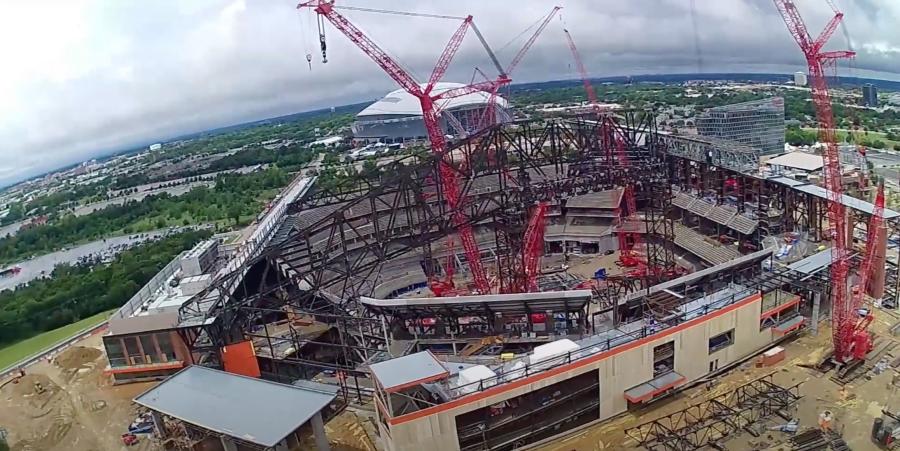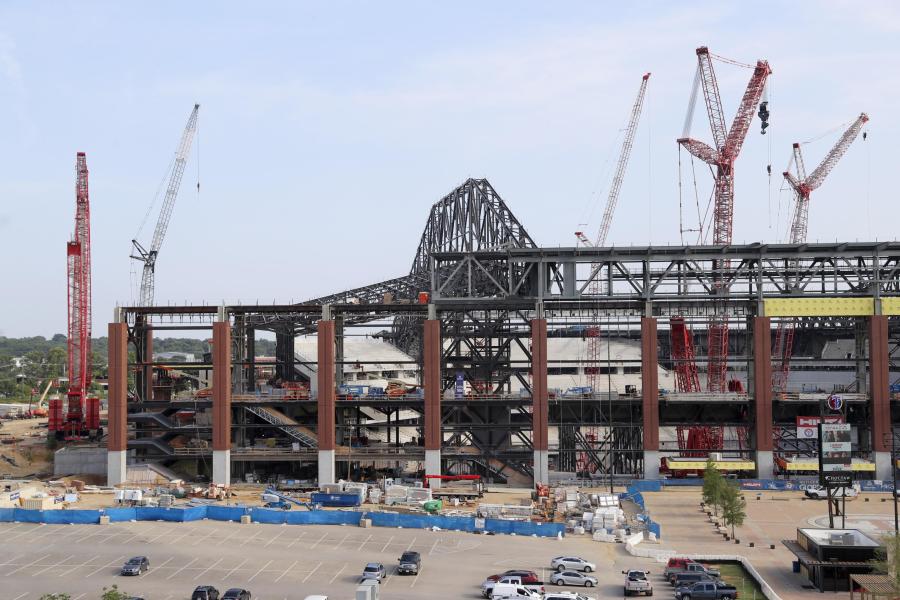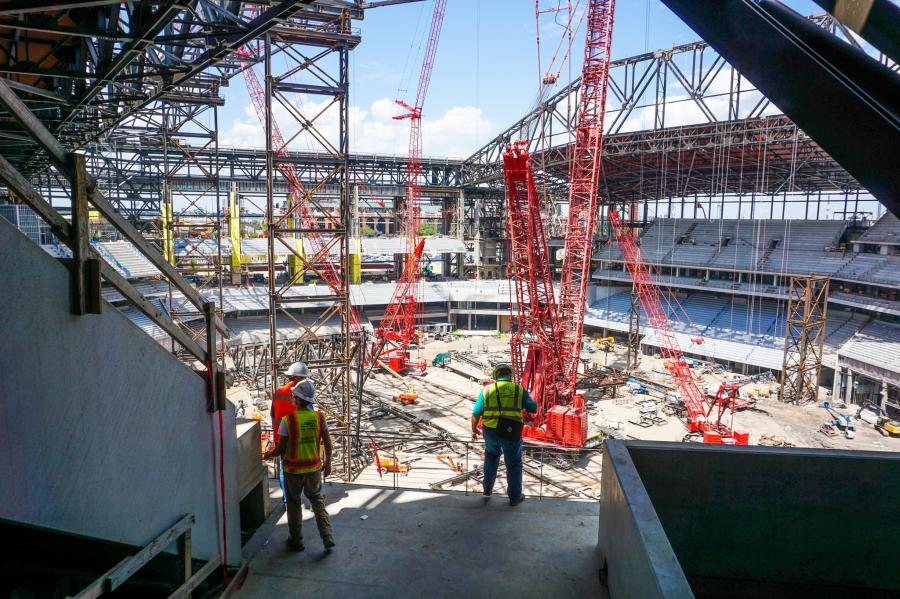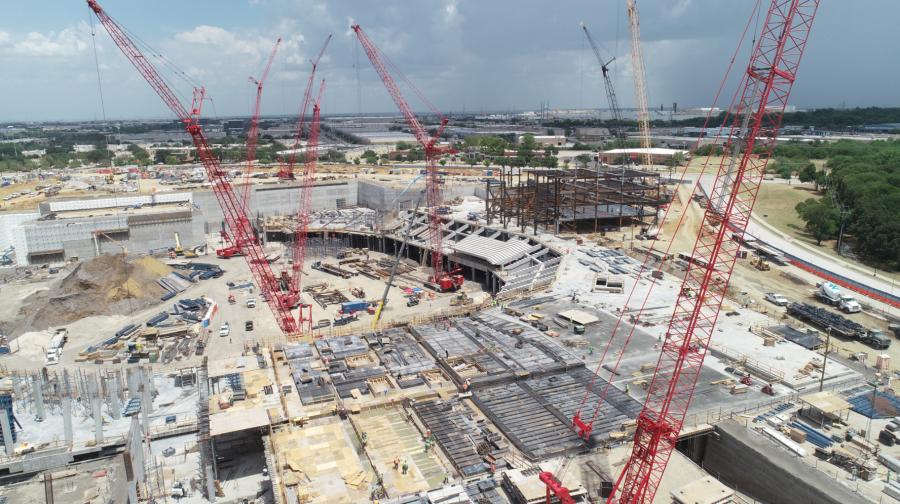Manhattan Construction Company employed the DJI Phantom 4 Pro drone to facilitate getting the job done in a little more than 30 months.
The Manhattan Construction Company won the AGC Build America Award in 2021 for the construction of Globe Life Field in Arlington, Texas, home of Major League Baseball's Texas Rangers. While building that sports center, at a cost of more than $1 billion, Manhattan employed the DJI Phantom 4 Pro drone to facilitate getting the job done in a little more than 30 months.
Jim Cuddiahee, Manhattan Construction Company's vice president, oversaw the construction of the new stadium and stated that accomplishing this colossal undertaking on time involved using drone images "in trade partner meetings to plan and coordinate activities in the coming days and weeks."
Comparing traditional ground-based methods with drone use, a rundown from UAV Coach, a free resource for drone training and industry news, said, "Typically, data is collected by construction personnel walking a site by foot, manually gathering information as they go. But this process is labor-intensive and slow, and doesn't allow companies to react quickly to changes on the ground"; however, "a drone pilot can gather the same visual data that it might take a surveyor working for a construction company half a day to collect by walking on foot."
Additionally, numerous online sources tout the efficacy of drones for safely showing project progress to financiers without disrupting workflow.
Many drone users, both amateur and professional, continue to favor the Phantom series, since its debut in 2013, due to its ease of use. With up to 30 minutes of flight time and a 20 megapixel by 1-in. camera sensor, the DJI Phantom 4 Pro, released in 2017, was state-of-the-art when the Globe Life Field project started. Also, the optical sensor unit in this model, which detects and avoids obstacles in flight, allows it to more safely navigate numerous crews working simultaneously on what Cuddiahee remarked as a "tight site."
Furthermore, the Phantom 4 Pro possesses the ability to assist in the creation of orthomosaic maps — a form of cartography that corrects for camera angle while stitching photos together, creating to-scale photographs of large areas.
By 2020, DJI rocketed to a 77 percent market share of America's consumer drone sales, according to a Bloomberg report, making it the largest drone producer worldwide. CEG reached out to DJI about how that company envisions drone use in massive construction projects. Here is the product of that exchange:
CEG: What kinds of features does the DJI Phantom 4 Pro have that make it a good choice for coordinating activities during construction of a 40,000-plus seat professional baseball stadium?
DJI: [The] Phantom 4 Pro, and its successor, the Phantom 4 RTK, accelerates critical jobsite functions and capture actionable, real-time data across complex job sites. For example, when undertaking a large-scale construction project, such as a professional baseball stadium, drones significantly reduce the operating time for building information monitoring (BIM), 3D mapping, progress monitoring, documentation, and inspection tasks.
With built-in centimeter-level navigation, DJI's latest drones can create detailed 3D construction site maps that more accurately depict reality. Sitemaps made prior to construction optimize site planning, while 3D models created throughout construction help teams stay informed and allocate resources to appropriate tasks. When used to track the progress of a large-scale construction project, drones automate workflows and digitize assets to ensure that every team is on the same page and has access to real-time data.
CEG: What features on later models did projects like Globe Life Field inspire?
DJI: Drones in construction began as "eyes in the sky," but quickly evolved to leverage more sophisticated applications that could generate BIM models, create 3D sitemaps and execute challenging inspection missions requiring thermal imaging. Drone innovation in the construction industry has provided specialized solutions for specific use cases. The biggest drone may not be the best for your situation; different solutions are optimal for different environments. DJI's enterprise solutions for construction include the all-in-one Phantom aircraft and more comprehensive solutions consisting of modeling platforms and custom
Software Development Kits (SDKs) and payloads designed particularly for specific mapping, surveying and inspection scenarios.
The Phantom 4 RTK, accelerates work progress on construction sites with precise 3D models. The RTK records lens parameters, position, altitude and other data onto each photo, matching the positioning data to the center of the camera's CMOS sensor to accurately record data and stitch images together. In addition, the RTK module makes it possible to create detailed 2D and 3D maps without requiring ground control points (GCPs), saving hours in set-up time and improved workability.
CEG: As far as use on massive construction projects, what is the highest praise conveyed to DJI for the Phantom 4 Pro by end users?
DJI: While no longer in production, the Phantom 4 Pro continues to be loved by users worldwide. DJI's enterprise Phantom 4 RTK combines the beloved flight characteristics of the Phantom 4 Pro with increased capabilities to deliver increasingly innovative solutions. STRABAG, a leading Austrian construction company estimates drones enable them to conduct surveys with 75 percent reduced GCP set-up time. In the U.S., contractor Hensel Phelps estimates inspections are eight times more efficient with drones. The Beck Group estimates drones reduced re-work by 25 percent when building Dickies Arena, a major public arena in Fort Worth, Texas.
CEG: What kinds of interesting stories are folks in the construction and surveying field relating to DJI?
DJI: Scheffer Andrew Ltd. Planners and Engineers in Alberta, Canada, said its drone surveys have proven so accurate and so efficient that the advantage over traditional GPS-based ground topographical surveys is obvious. "Being able to produce centimeter-accurate mapping that's rivaling GPS topo survey is pretty darn unique and awesome," said Ray Penner, who put his model aircraft experience to work by starting Scheffer Andrew's drone program. "There's one job site that we did in Calgary — it was only 250 meters by 250 meters, but the elevation difference from north to south was almost 5 meters. The guy that was surveying it even told my engineer to get the drone as he would not be able to complete the work as quickly or thoroughly." CEG
Today's top stories





















